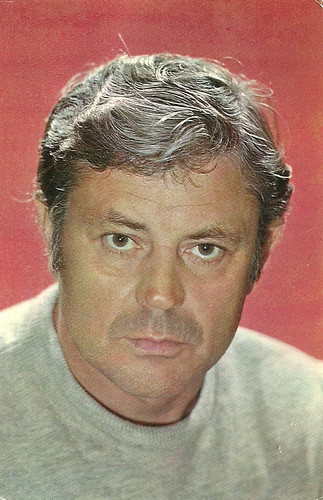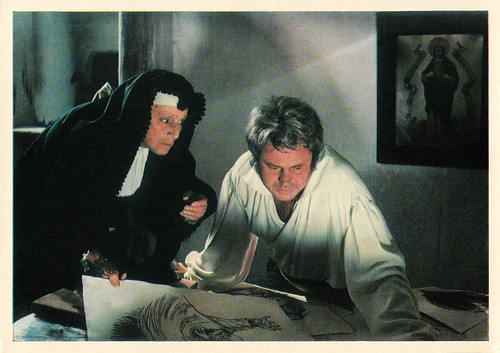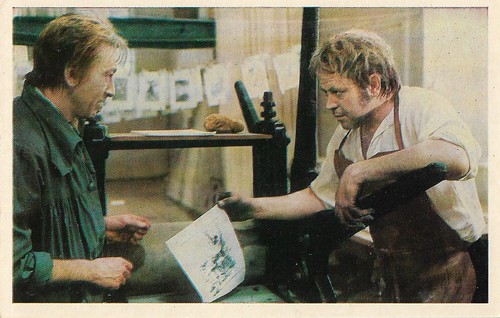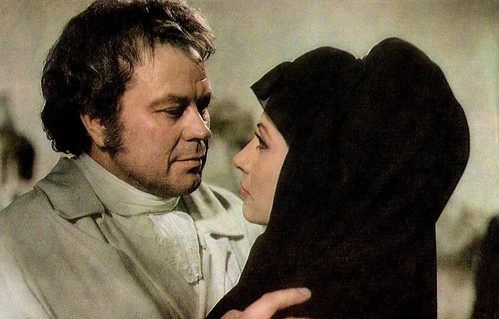On Thursday 4 September 2014, iconic Soviet-era actor Donatas Banionis (1924-2014) has died in Vilnius at the age of 90. The Lithuanian actor is best known as Kris Kelvin, the lead role of Andrei Tarkovsky's legendary Science-Fiction film Solyaris/Solaris (1972). In another role, he inspired Vladimir Putin to become a KGB spy.

Soviet-Russian postcard.

Soviet postcard by Izdanie Bjuro Propagandy Sovetskogo Kinoiskusstva, no. 3, 107/72, 1972. Photo: Arkadi Zager. Donatas Banionis at right as Don Francisco de Goya y Lucientes and Fred Düren as Agustín Estevez in Goya – oder der arge Weg der Erkenntnis/Goya or the Hard Way to Enlightenment (Konrad Wolf, 1971). The postcard was issued in 150,000 copies. Retail price: 8 Kop.

Soviet-Russian postcard, 1972.
Donatas Banionis was born in Lithuania's central city of Kaunas, in 1924. His mother, Blazhaitite-Banionene Ona, was a homemaker. His father, Juozas Banionis, was a tailor who took part in the Russian Revolution of 1917, was wounded in the Russian Civil War, then became a political prisoner, and briefly emigrated to Brazil during the 1920s. Young Banionis was raised with his elder sister during the years of Lithuanian independence before WWII.
After visiting the Kaunas School of Crafts, Banionis began his acting career at the age of 17 at the Drama Theatre of Panevėžys, where his first teacher was Juozas Miltinis.
In 1959, he started to act in films. He made his film debut in the Lithuanian film Adomas nori buti zmogumi/Adam Wants To Be A Human (Vytautas Zalakevicius, 1959). His performance of the farmer Vaitkus in Niekas nenorėjo mirti/Nobody Wanted to Die (Vytautas Žalakevičius, 1965) won him the award for best actor at the Karlovy Vary film festival. Soon he was a highly requested actor, with many parts in prestigious national and international productions.
He played Ladeinikov, a James Bond-like intelligence agent in the Soviet spy film Myortvyy sezon/Dead Season (Savva Kulish, 1966). This role reportedly inspired Vladimir Putin in his choice to become a KGB officer. When years later, Banionis met the Russian president at the Kremlin, the actor asked if it was true that his character influenced his choice of profession. Putin laughed and said, “Yes, I suppose you can say that.”
Banionis had a supporting part in Mikhail Kalatozov’s Italo-Russian production Krasnaja palatka/The Red Tent (1969), The film is based on the story of Roald Amundsen's (Sean Connery) expedition to rescue Umberto Nobile (Peter Finch) and the other survivors of the crash of the Airship Italia.
He also played the title roles of Francisco Goya of the USSR-GDR coproduction Goya – oder der arge Weg der Erkenntnis/Goya or the Hard Way to Enlightenment (Konrad Wolf, 1971), and Ludwig van Beethoven in the DEFA-production Beethoven - Tage aus einem Leben/Beethoven-Days in a Life (Horst Seemann, 1976).

Soviet postcard by Izdanie Bjuro Propagandy Sovetskogo Kinoiskusstva, no. 107/72, 1972. Photo: Arkadi Zager. Donatas Banionis as Don Francisco de Goya y Lucientes and Veriko Anjaparidze as Goya's Mother in Goya – oder der arge Weg der Erkenntnis/Goya or the Hard Way to Enlightenment (Konrad Wolf, 1971). The postcard was issued in 150,000 copies. Retail price: 8 Kop.

Soviet postcard by Izdanie Bjuro Propagandy Sovetskogo Kinoiskusstva, no. 3, 107/72, 1972. Photo: Arkadi Zager. Donatas Banionis at right as Don Francisco de Goya y Lucientes and Mikhail Kozakov as Ambassador in Goya – oder der arge Weg der Erkenntnis/Goya or the Hard Way to Enlightenment (Konrad Wolf, 1971). The postcard was issued in 150,000 copies. Retail price: 8 Kop.

Soviet postcard by Izdanie Bjuro Propagandy Sovetskogo Kinoiskusstva, no. 3, 107/72, 1972. Photo: Arkadi Zager. Donatas Banionis at right as Don Francisco de Goya y Lucientes and Fred Düren as Agustín Estevez in Goya – oder der arge Weg der Erkenntnis/Goya or the Hard Way to Enlightenment (Konrad Wolf, 1971). The postcard was issued in 150,000 copies. Retail price: 8 Kop.

Soviet postcard by Izdanie Bjuro Propagandy Sovetskogo Kinoiskusstva, no. 32-2289, 1972. Photo: Arkadi Zager. Donatas Banionis as Don Francisco de Goya y Lucientes and Lyudmila Chursina as Doña Pepa Tudo in Goya – oder der arge Weg der Erkenntnis/Goya or the Hard Way to Enlightenment (Konrad Wolf, 1971). The postcard was issued in 300,000 copies. Retail price: 5 Kop.
Donatas Banionis played a supporting part in Grigori Kozintsev’s drama Korol Lir/King Lear (1971), based on William Shakespeare's play King Lear. The film featured the Estonian actor Jüri Järvet, who would play again opposite Banionis in his most well-known film part.
Banionis played Kris Kelvin in Andrei Tarkovsky’s remarkable Science-Fiction film Solyaris/Solaris (1972), based on Stanislaw Lem’s novel.
Kelvin, a psychologist, is sent to a space station placed in orbit around the planet Solaris, where the two surviving scientists of five (three committed suicide) tell him that the ocean of the planet is capable to fulfil their wishes. Kelvin meets his dead wife Hari (Natalya Bondarchuk), tries to kill this phantom but fails to do so, and she becomes more and more real, even if lacking a memory. The phantoms prove to be the products of the planet, communicating with humans.
In the end, Kelvin returns to Earth. Or is this Earth also a simulation? Tarkovsky thus stressed the limits of knowledge, the reality behind reality, and the subjectivity of perception.
The film premiered at the 1972 Cannes film festival, won the Grand Prix Spécial du Jury and was nominated for the Palme d'Or. It premiered in the Soviet Union in 1973.
In 2002 a remake of the film was made by Steven Soderbergh, Solaris, starring George Clooney. Dreading the making of this remake, in 2002 Salman Rushdie praised Tarkovsky’s original as an “exploration of the unreliability of reality and the power of the human unconscious, the great examination of the limits of rationalism and the perverse power of even the most ill-fated love”.

East-German postcard by VEB Progress Film-Vertrieb, Berlin, no. 28/71, 1971. Photo: Sager. Donatas Banionis in Goya – oder der arge Weg der Erkenntnis/Goya or the Hard Way to Enlightenment (Konrad Wolf, 1971).

Soviet postcard by Izdanie Bjuro Propagandy Sovetskogo Kinoiskusstva, no. 108/78. Photo: V. Muraško. The postcard was issued in 40,000 copies. Retail price: 8 Kop.
About Donatas Banionis' later career, Steve Shelokhonov writes at IMDb: “Donatas Banionis constituted the link between the cinema of the past and contemporary Lithuanian film. He showed reserved and convincing work in the role of 'The old man' in Kiemas/Courtyard (Valdas Navasaitis, 1999), a reflective film about a Lithuanian father and his family's depressing fate in the Soviet Union of the 1970s.
He worked with director Aleksandr Buravskiy in Leningrad/Attack on Leningrad (2006), a film about the historic siege during the Second World War. Here his acting partners were e.g. Gabriel Byrne, Mira Sorvino, Aleksandr Abdulov, Kirill Lavrov, and Mikhail Efremov.”
During his 65 years of acting, Banionis played over 50 roles in film and on television, and over 100 stage parts, mainly at the Panevezys Juozas Miltinis' Drama Theatre, which was frequented by Donatas' fans from all over the former Soviet Union. He also acted in Vilnius at the Lithuanian National Drama Theatre.
Banionis was designated People's Actor of the USSR (1974), and People's actor of the Lithuanian Republic (1973). He was a Chevalier of the Order of the Lithuanian Grand Duke Gediminas.
On 4 September 2014, Donatas Banionis passed away in a hospital in Vilnius (though Shelokhonov at IMDb states it was in his hometown Panevėžys). He died of a stroke he suffered two days earlier. Banionis was 90 years old. He had been married to Ona Konkuleviciute and they had two children.
President Putin expressed his condolences in a message to Banionis’s son Raimundas: “Russians sincerely share your deep sorrow. “We all remembered and loved Donatas Banionis, valued his talent, amazing acting technique and personal charisma, and his inimitable theatrical and cinematic works.”

Soviet postcard by Izdanie Bjuro Propagandy Sovetskogo Kinoiskusstva, no. 107/72, 1972. Photo: Arkadi Zager. Donatas Banionis as Don Francisco de Goya y Lucientes and Olivera Katerina as the Duchess Cayetana of Albain in Goya – oder der arge Weg der Erkenntnis/Goya or the Hard Way to Enlightenment (Konrad Wolf, 1971). The postcard was issued in 150,000 copies. Retail price: 8 Kop.

East-German postcard. Donatas Banionis in the USSR-GDR coproduction Goya – oder der arge Weg der Erkenntnis / Goya, or the Hard Way to Enlightenment (Konrad Wolf, 1971).

Soviet-Russian postcard. Photo: Mosfilm. Donatas Banionis and Pavel Pankov in the Soviet-Russian TV series in four episodes Zhizn i smert Ferdinanda Lyusa/ Life and Death of Ferdinand Luce (Anatoli Bobrovsky, 1977), based on the story 'A Bomb for the Chairman' by J. Semionov. Banionis played the title character.
Sources: Steve Shelokhonov (IMDb), FRERL, The Daily Beast, Wikipedia (English and Dutch), and IMDb.
This post was last updated on 26 June 2021.

Soviet-Russian postcard.

Soviet postcard by Izdanie Bjuro Propagandy Sovetskogo Kinoiskusstva, no. 3, 107/72, 1972. Photo: Arkadi Zager. Donatas Banionis at right as Don Francisco de Goya y Lucientes and Fred Düren as Agustín Estevez in Goya – oder der arge Weg der Erkenntnis/Goya or the Hard Way to Enlightenment (Konrad Wolf, 1971). The postcard was issued in 150,000 copies. Retail price: 8 Kop.

Soviet-Russian postcard, 1972.
Russian James Bond
Donatas Banionis was born in Lithuania's central city of Kaunas, in 1924. His mother, Blazhaitite-Banionene Ona, was a homemaker. His father, Juozas Banionis, was a tailor who took part in the Russian Revolution of 1917, was wounded in the Russian Civil War, then became a political prisoner, and briefly emigrated to Brazil during the 1920s. Young Banionis was raised with his elder sister during the years of Lithuanian independence before WWII.
After visiting the Kaunas School of Crafts, Banionis began his acting career at the age of 17 at the Drama Theatre of Panevėžys, where his first teacher was Juozas Miltinis.
In 1959, he started to act in films. He made his film debut in the Lithuanian film Adomas nori buti zmogumi/Adam Wants To Be A Human (Vytautas Zalakevicius, 1959). His performance of the farmer Vaitkus in Niekas nenorėjo mirti/Nobody Wanted to Die (Vytautas Žalakevičius, 1965) won him the award for best actor at the Karlovy Vary film festival. Soon he was a highly requested actor, with many parts in prestigious national and international productions.
He played Ladeinikov, a James Bond-like intelligence agent in the Soviet spy film Myortvyy sezon/Dead Season (Savva Kulish, 1966). This role reportedly inspired Vladimir Putin in his choice to become a KGB officer. When years later, Banionis met the Russian president at the Kremlin, the actor asked if it was true that his character influenced his choice of profession. Putin laughed and said, “Yes, I suppose you can say that.”
Banionis had a supporting part in Mikhail Kalatozov’s Italo-Russian production Krasnaja palatka/The Red Tent (1969), The film is based on the story of Roald Amundsen's (Sean Connery) expedition to rescue Umberto Nobile (Peter Finch) and the other survivors of the crash of the Airship Italia.
He also played the title roles of Francisco Goya of the USSR-GDR coproduction Goya – oder der arge Weg der Erkenntnis/Goya or the Hard Way to Enlightenment (Konrad Wolf, 1971), and Ludwig van Beethoven in the DEFA-production Beethoven - Tage aus einem Leben/Beethoven-Days in a Life (Horst Seemann, 1976).

Soviet postcard by Izdanie Bjuro Propagandy Sovetskogo Kinoiskusstva, no. 107/72, 1972. Photo: Arkadi Zager. Donatas Banionis as Don Francisco de Goya y Lucientes and Veriko Anjaparidze as Goya's Mother in Goya – oder der arge Weg der Erkenntnis/Goya or the Hard Way to Enlightenment (Konrad Wolf, 1971). The postcard was issued in 150,000 copies. Retail price: 8 Kop.

Soviet postcard by Izdanie Bjuro Propagandy Sovetskogo Kinoiskusstva, no. 3, 107/72, 1972. Photo: Arkadi Zager. Donatas Banionis at right as Don Francisco de Goya y Lucientes and Mikhail Kozakov as Ambassador in Goya – oder der arge Weg der Erkenntnis/Goya or the Hard Way to Enlightenment (Konrad Wolf, 1971). The postcard was issued in 150,000 copies. Retail price: 8 Kop.

Soviet postcard by Izdanie Bjuro Propagandy Sovetskogo Kinoiskusstva, no. 3, 107/72, 1972. Photo: Arkadi Zager. Donatas Banionis at right as Don Francisco de Goya y Lucientes and Fred Düren as Agustín Estevez in Goya – oder der arge Weg der Erkenntnis/Goya or the Hard Way to Enlightenment (Konrad Wolf, 1971). The postcard was issued in 150,000 copies. Retail price: 8 Kop.

Soviet postcard by Izdanie Bjuro Propagandy Sovetskogo Kinoiskusstva, no. 32-2289, 1972. Photo: Arkadi Zager. Donatas Banionis as Don Francisco de Goya y Lucientes and Lyudmila Chursina as Doña Pepa Tudo in Goya – oder der arge Weg der Erkenntnis/Goya or the Hard Way to Enlightenment (Konrad Wolf, 1971). The postcard was issued in 300,000 copies. Retail price: 5 Kop.
The planet Solaris
Donatas Banionis played a supporting part in Grigori Kozintsev’s drama Korol Lir/King Lear (1971), based on William Shakespeare's play King Lear. The film featured the Estonian actor Jüri Järvet, who would play again opposite Banionis in his most well-known film part.
Banionis played Kris Kelvin in Andrei Tarkovsky’s remarkable Science-Fiction film Solyaris/Solaris (1972), based on Stanislaw Lem’s novel.
Kelvin, a psychologist, is sent to a space station placed in orbit around the planet Solaris, where the two surviving scientists of five (three committed suicide) tell him that the ocean of the planet is capable to fulfil their wishes. Kelvin meets his dead wife Hari (Natalya Bondarchuk), tries to kill this phantom but fails to do so, and she becomes more and more real, even if lacking a memory. The phantoms prove to be the products of the planet, communicating with humans.
In the end, Kelvin returns to Earth. Or is this Earth also a simulation? Tarkovsky thus stressed the limits of knowledge, the reality behind reality, and the subjectivity of perception.
The film premiered at the 1972 Cannes film festival, won the Grand Prix Spécial du Jury and was nominated for the Palme d'Or. It premiered in the Soviet Union in 1973.
In 2002 a remake of the film was made by Steven Soderbergh, Solaris, starring George Clooney. Dreading the making of this remake, in 2002 Salman Rushdie praised Tarkovsky’s original as an “exploration of the unreliability of reality and the power of the human unconscious, the great examination of the limits of rationalism and the perverse power of even the most ill-fated love”.

East-German postcard by VEB Progress Film-Vertrieb, Berlin, no. 28/71, 1971. Photo: Sager. Donatas Banionis in Goya – oder der arge Weg der Erkenntnis/Goya or the Hard Way to Enlightenment (Konrad Wolf, 1971).

Soviet postcard by Izdanie Bjuro Propagandy Sovetskogo Kinoiskusstva, no. 108/78. Photo: V. Muraško. The postcard was issued in 40,000 copies. Retail price: 8 Kop.
People's actor of the USSR
About Donatas Banionis' later career, Steve Shelokhonov writes at IMDb: “Donatas Banionis constituted the link between the cinema of the past and contemporary Lithuanian film. He showed reserved and convincing work in the role of 'The old man' in Kiemas/Courtyard (Valdas Navasaitis, 1999), a reflective film about a Lithuanian father and his family's depressing fate in the Soviet Union of the 1970s.
He worked with director Aleksandr Buravskiy in Leningrad/Attack on Leningrad (2006), a film about the historic siege during the Second World War. Here his acting partners were e.g. Gabriel Byrne, Mira Sorvino, Aleksandr Abdulov, Kirill Lavrov, and Mikhail Efremov.”
During his 65 years of acting, Banionis played over 50 roles in film and on television, and over 100 stage parts, mainly at the Panevezys Juozas Miltinis' Drama Theatre, which was frequented by Donatas' fans from all over the former Soviet Union. He also acted in Vilnius at the Lithuanian National Drama Theatre.
Banionis was designated People's Actor of the USSR (1974), and People's actor of the Lithuanian Republic (1973). He was a Chevalier of the Order of the Lithuanian Grand Duke Gediminas.
On 4 September 2014, Donatas Banionis passed away in a hospital in Vilnius (though Shelokhonov at IMDb states it was in his hometown Panevėžys). He died of a stroke he suffered two days earlier. Banionis was 90 years old. He had been married to Ona Konkuleviciute and they had two children.
President Putin expressed his condolences in a message to Banionis’s son Raimundas: “Russians sincerely share your deep sorrow. “We all remembered and loved Donatas Banionis, valued his talent, amazing acting technique and personal charisma, and his inimitable theatrical and cinematic works.”

Soviet postcard by Izdanie Bjuro Propagandy Sovetskogo Kinoiskusstva, no. 107/72, 1972. Photo: Arkadi Zager. Donatas Banionis as Don Francisco de Goya y Lucientes and Olivera Katerina as the Duchess Cayetana of Albain in Goya – oder der arge Weg der Erkenntnis/Goya or the Hard Way to Enlightenment (Konrad Wolf, 1971). The postcard was issued in 150,000 copies. Retail price: 8 Kop.

East-German postcard. Donatas Banionis in the USSR-GDR coproduction Goya – oder der arge Weg der Erkenntnis / Goya, or the Hard Way to Enlightenment (Konrad Wolf, 1971).

Soviet-Russian postcard. Photo: Mosfilm. Donatas Banionis and Pavel Pankov in the Soviet-Russian TV series in four episodes Zhizn i smert Ferdinanda Lyusa/ Life and Death of Ferdinand Luce (Anatoli Bobrovsky, 1977), based on the story 'A Bomb for the Chairman' by J. Semionov. Banionis played the title character.
Sources: Steve Shelokhonov (IMDb), FRERL, The Daily Beast, Wikipedia (English and Dutch), and IMDb.
This post was last updated on 26 June 2021.
No comments:
Post a Comment